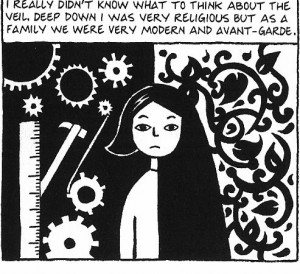Hello, everyone!
This week our class have some discussion about persepolis, which is a novel conducted by Marane Satrapi depicting her childhood in Tehran Iran. This is a girl loves punk rock and several western music, especially Michel Jackson, wearing unorthodox jackets, and not afraid of rebut teachers’ lies about the abuse of government’s power. Although this seems common among peers in western countries, what make this girl special is the backdrop of Islamic revolution and the rapidly changing political situation. The subtitle “the story of a childhood”, as itself, is not merely a documentary material about the history of Iran, but more than a biography in which the author delineate what her childhood is like, how the policy deeply influence she, her relatives, even the community.
As we can see from the article, Satrapi, in the political aspect, went through several changes. In the very first of her childhood Satrapi believe in god, considering god to create the king and dreaming of being a prophet. When the time the revolution was taken she, after being enlightened by books about Fidel Castro, Vietnamese killed by Americans and the revolutionaries of Iran, encountered and embraced communism; faith changed. What surprise me most is the attention paid on policy by Satrapi in such a young age while me, in comparison, possessed blank knowledge about policy at that age, which keeps me digging the reason.
This remind me of “The Role of Interpretative Communities in Remembering and Learning” conducted by Shazad( the author in my first blog). In my perspective, the families, modern and avant-grade(as we can see the depiction from the picture) , are active in participate in allies and protection. Thus the news her parents selected, TV program they turn on, or dinner chat all together, became a certain way of the interpretation and selection of information. There were several interpretative communities faced in her childhood, parents, uncle Annosh, neighbour, teachers etc.. And the process of which one to believe, which one to cast-off are sometimes hard and confusing. I came up with a question in my first blog which is “Would the government exert deeper influence than teacher(who is individual) regarding of information interpretation?”. I am trying to find my answer in a shutter in which SHAH(the king of Iran) on the screen of television and make a speech “I understand your revolt. Together we will try to march toward democracy”, however, the information is received but not accepted by satrapi’s parents who, according to the shutter, ridicule the speech and the fake veil behind. Under the circumstances that government control the method and technology of the flowing of information(like squelch the rebel violently), Satrapi and her family developed their own way of mediate and select the information. The communication of modern are even beyond the family, we can also see it among the rebel and activists, which, literally speaking, is standing in the opposite side of the government.
, are active in participate in allies and protection. Thus the news her parents selected, TV program they turn on, or dinner chat all together, became a certain way of the interpretation and selection of information. There were several interpretative communities faced in her childhood, parents, uncle Annosh, neighbour, teachers etc.. And the process of which one to believe, which one to cast-off are sometimes hard and confusing. I came up with a question in my first blog which is “Would the government exert deeper influence than teacher(who is individual) regarding of information interpretation?”. I am trying to find my answer in a shutter in which SHAH(the king of Iran) on the screen of television and make a speech “I understand your revolt. Together we will try to march toward democracy”, however, the information is received but not accepted by satrapi’s parents who, according to the shutter, ridicule the speech and the fake veil behind. Under the circumstances that government control the method and technology of the flowing of information(like squelch the rebel violently), Satrapi and her family developed their own way of mediate and select the information. The communication of modern are even beyond the family, we can also see it among the rebel and activists, which, literally speaking, is standing in the opposite side of the government.
Maybe in a certain time axis, the role of interpretation government play will decent due to people’s distrust.